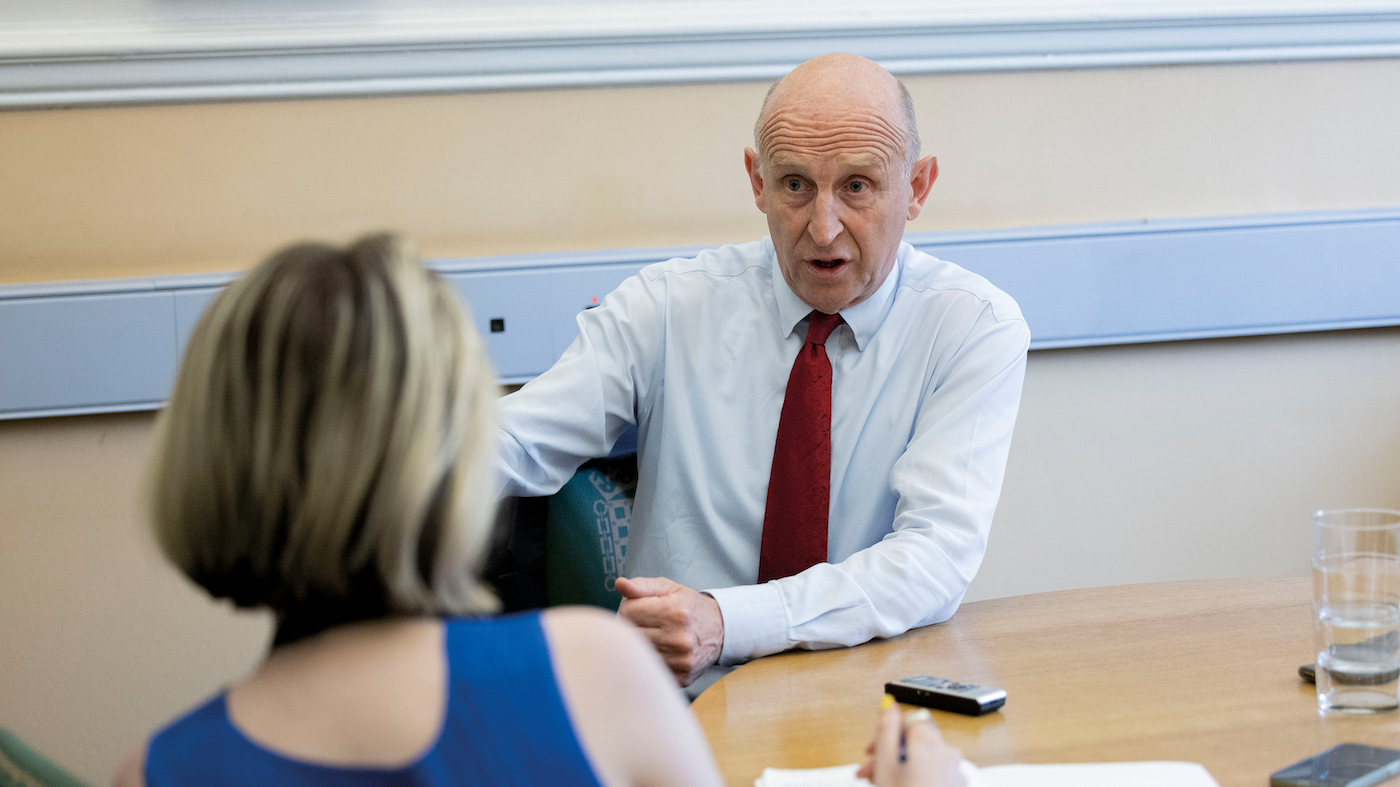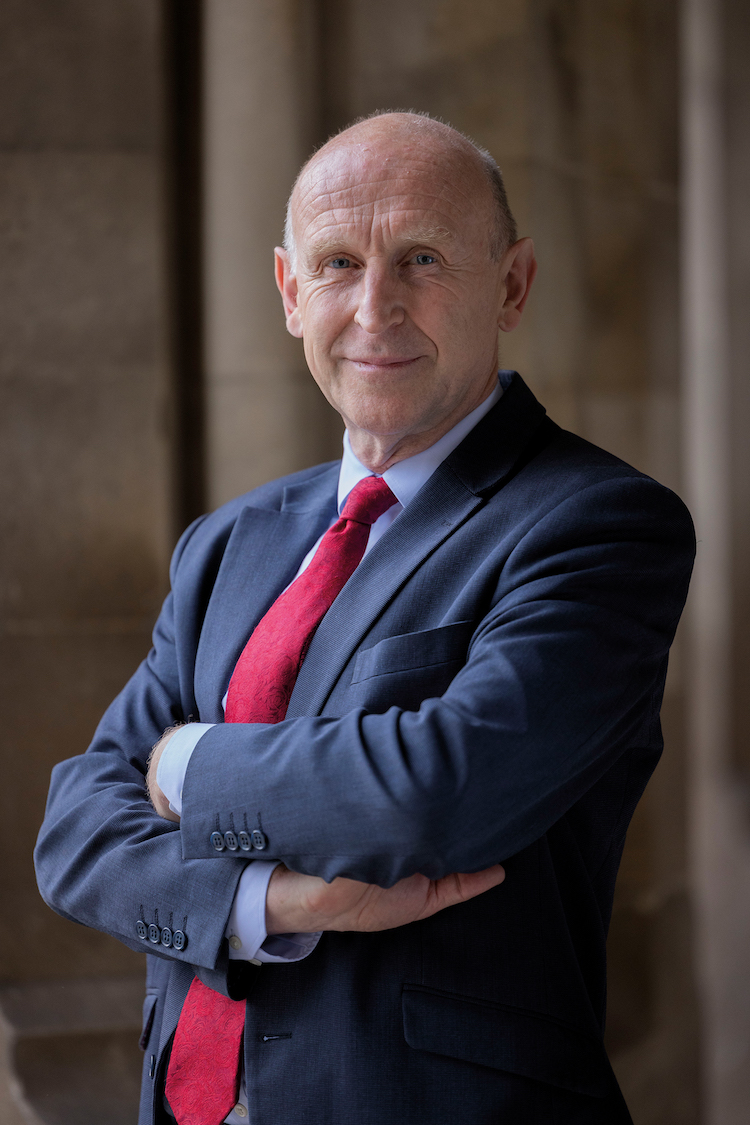The John Healey interview: "We are falling short on our Nato obligations"
Shadow defence secretary John Healey MP (Photography by Wilde Fry for The House magazine)
10 min read
Shadow defence secretary John Healey is determined to do better by our armed forces. He tells Tali Fraser it’s time for Britain to reboot defence plans, improve spending and restore the nation’s moral contract with its military. Photography by Wilde Fry
John Healey is disgusted by the way our service personnel are treated. The shadow defence secretary, 63, rattles off statistics from the latest survey of servicemen and women, released at the start of the month. Satisfaction with forces life is down to 42 per cent; only 46 per cent are satisfied with the standard of housing, with just 19 per cent satisfied with responses to requests for maintenance/repair work; and half of personnel don’t believe their family benefits from being a service family.
No wonder, he says, we have a growing problem recruiting and retaining forces, adding that there has been “a corrosion of the nation’s moral contract” with the military “over 13 years of Conservative government”.
The day we meet, Healey is in campaign mode. He had just placed an application for an urgent question over reports that last year’s below-inflation pay rise has left some military personnel in financial difficulties – unable to afford even the price of subsidised mess meals.
“Like everyone across Britain, Labour has deep respect for the serving men and women of our armed forces. Theirs is the ultimate public service. But I was really concerned by reports about our forces using foodbanks at RAF Coningsby and having to choose between ‘food or fuel’. Those serving our country should not be relying on foodbanks to feed their families.
“The public as well as MPs want to know why this is happening and what the government is doing to ensure forces personnel can cope with this cost of living crisis.”
“When you consider that those who serve are signing up for the ultimate public service. They’re willing to fight and willing to die to protect the rest of us; as a country we have to do better.”
Those serving our country should not be relying on foodbanks to feed their families
If the moral contract between Britain and its military has worn away, how does he plan to restore it? The former housing and planning minister (in Gordon Brown’s government) turns straight back to his old brief.
“I see housing at the heart of everyone’s lives,” he tells me, “and it is no different for the forces. In many ways, it is more important: if you’re on deployment, you need to know that your loved ones are comfortable and settled. The last thing you need to be worrying about is their conditions while serving.”
To give a sense of the current situation, housing compensation claims for military families are up 400 per cent since new contractors were appointed last year, while 4,000 personnel are living in accommodation so poor that the Ministry of Defence (MoD) doesn’t charge them rent.
Healey has appointed former head of the civil service and former permanent secretary of the housing department, Lord Bob Kerslake, to complete an independent review of military accommodation.
The report, which will contain a series of recommendations, is set to be completed before Christmas, Healey says, “which will give me the options to form a plan that, were we to win the next election, we will put in place over the first term of a Labour government to fix these long-running problems”.
The Forces Help to Buy scheme is one of the problems in his sights. Healey brands it “less of a help” than the usual Help to Buy, saying: “I have been really disappointed by the pale shadow of the scheme in place for forces families that want to buy their own homes. The numbers using it are fewer and fewer… the scheme is too inflexible to provide the sort of help they need.”
When asked exactly what he wants to change within the scheme, he points to Lord Kerslake’s upcoming report: “We will sort out the solutions when we come to them.”
 John Healey MP being interviewed by Tali Fraser (Photography by Wilde Fry for The House magazine)
John Healey MP being interviewed by Tali Fraser (Photography by Wilde Fry for The House magazine)
While he waits for this Christmas gift from Lord Kerslake, Healey wants to focus on “speaking up more” for a group of people who are not always able to do so themselves. “It’s quite clear that those in uniform display some of the qualities we all respect most: courage, loyalty, a sense of humour, a sense of service. But part of that is the discipline of recognising it’s hard for them to speak up, so we need to do more on that front – and we will.”
This critique is directed across Parliament, not just to those in government. “Parliament needs to do better,” he says. “Many in the forces have been looking at what’s been going on recently and saying: ‘The turmoil that our country is in has very little to do with me, but you seem to have too little attention or concern for the problems I’m facing’.”
Healey adds that the looming reason the “armed forces need a much stronger voice” is because ministers are out of touch with the problems of frontline forces. But while the Defence Secretary Ben Wallace does have military experience, Healey does not. Studying at Cambridge, Healey learnt to fly for the university air squadron. He was trained on Bulldog aircraft by the RAF and amassed more than 40 flying hours, but recognised that the forces “long-term, full-time, was not for me”.
He is, however, determined to listen to military personnel and represent their interests, highlighting what he see as “an obvious government shortfall” in not implementing the armed forces covenant .
“The job is half done,” he insists, “and it is not good enough for central government to absolve itself from the same responsibilities we are rightly imposing on local service agencies and local authorities,” with all 407 local authorities in mainland Great Britain and four Northern Ireland councils having pledged to uphold it.
We need to have the UK secured as the leading European nation within Nato
It begs the question: if our military is treated so poorly, and our forces feel so unsatisfied, can we still call ourselves a military superpower? Healey doesn’t exactly give a resounding yes, instead replying: “I think you will generally find other countries still look at our forces as top rank.”
The shadow defence secretary adds: “What worries me is that we are falling short on our Nato obligations.”
He has concerns over reported plans of personnel cuts which would leave the British army the smallest it has been since the Napoleonic era, something he says he and Labour leader Keir Starmer have been campaigning against for two years.
“At a time when we’re facing this war in Europe, at a time where Nato is raising its high-readiness force to 300,000-strong from 40,000, Britain is still travelling in the opposite direction.”
Healey says it leaves question marks over whether Britain can “fully field what we’ve always been committed to: a full fighting division for Nato”.
The biggest threats and risks for Britain, he says, remain in the Nato area – Europe, the North Atlantic and Arctic. So that it is also where our primary responsibilities fall. “It must be the first priority for our forces, not where the business opportunities lie… We need to have the UK secured as the leading European nation within Nato so we’re able to help Nato forge its response to future Russian aggression, to the opening up of the Arctic under climate change, and to setting a strategy for dealing with the challenges of China for the long term.”
A key element to this, Healey says, is rebuilding relationships within Europe: “Britain has badly damaged its relations with key European countries and allies in the Brexit process, sometimes deliberately so. We have to rebuild those to make Brexit work, but in defence and security, we have to build those relationships because it reinforces the security for us all.”
Were Labour to get into government, co-operation with the EU would be a key tenet of their defence positioning: “We will try to seal a defence and security agreement, a formal pact with the European Union, for that,” says Healey.
 John Healey MP (Photography by Wilde Fry for The House magazine)
John Healey MP (Photography by Wilde Fry for The House magazine)
Healey has already been speaking to a number of “key European countries” to discuss what work they can do together, and flags Germany as an example: “There is a great deal of scope for Britain and Germany, formally and systematically, to work much closer together on defence and security. I’d like to see, within months of a Labour government coming into office, a far-reaching UK-Germany defence and security pact. I believe there’s the opportunity and I believe there’s the necessity to do that.”
He believes it will mark “a fresh approach to Europe” after recent years of “a government that is barely able to say the words ‘Europe’ or ‘European Union’, let alone strike the relationships that are in all of our interests”. But “credit where credit’s due”, Healey adds, the government’s response to Ukraine has been “really strong” – and Labour will continue to give its “fullest support” to their plans.
Although there are still improvements to be made, especially when it comes to the “sluggish” procurement and replenishment of our military equipment: “Ukraine has served as a really harsh reminder that when a country is forced to fight or is at risk, your armed forces are only as strong as the industry behind them.
“We’ve seen a sluggish response to the Ukraine crisis, it took 287 days before the MoD managed to get its act together to sign a contract for replacement of next generation light anti-tank weapon (NLAWs)… and the first new ones of those will not be produced until next year. So we’ve got a big job to replenish the stockpiles for our own forces.”
He wants to make sure that British taxpayers’ funding is directed first towards British jobs and British firms, gearing up domestic military industry: “When we’re a country spending upwards of £20bn a year on equipment for our military… the first principle should be that we use it to reinforce British jobs.”
Fundamentally, Healey wants to see defence plans and spending rebooted following Putin’s invasion of Ukraine. “I see 25 other Nato nations that have done that. We have done neither,” he says, “and I am concerned there may be a loss of momentum, having not kicked our industry into action.”
A good start would be the publication of the 2023 action plan for Ukraine that Healey says Ben Wallace promised back in August last year, to deliver a key message from the UK to Putin: “It would help reassure Ukraine that our support will continue. It’ll help us encourage other countries to do more. It will help kick our own industry towards the production levels we need and, most importantly, it will say to Putin: ‘Look, things are getting worse not better for Russia’.”
That message, he says, will be one thing that would not be changing with a Labour government.
